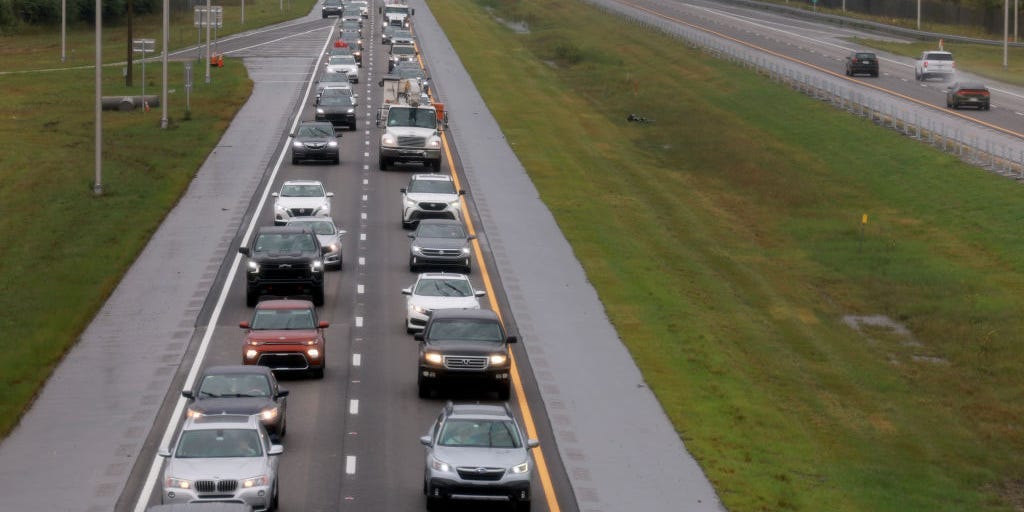- Hurricane Milton threatens Florida’s Central Gulf Coast with Category 4 winds and storm surge.
- Residents are still recovering from Hurricane Helene, which hit the area in early October.
- Evacuations create financial strain, as residents like Makayla Pelletier flee to safety.
For the first few hours of the roughly 80-mile drive from Tampa to Orlando, Makayla Pelletier and her boyfriend fiddled between radio stations and tried to make small talk — anything to calm their nerves as rain poured on Interstate 4’s gridlocked traffic.
But, as their gas tank ticked lower, the couple went quiet.
Hurricane Milton is expected to hit Florida’s Central Gulf Coast on Wednesday night, as residents recover from Hurricane Helene, a storm that killed more than 230 people and caused major flooding across the Southeastern US last week. Local meteorologists have warned of Milton’s impending storm surge and strong winds.
Pelletier, 23, has experienced about 10 hurricane evacuations since she moved to Tampa six years ago. But Milton, a Category 4 storm, is especially “terrifying,” she said.
“I don’t know a single person who’s not evacuating,” Pelletier said. “It definitely feels different: the mood is eerie, the tensions are high, the gas is out, the hotels are booked.”
Evacuation orders for Tampa and the surrounding areas began on October 7. In a CNN interview that day, Tampa Mayor Jane Castor said, “I can say without any dramatization whatsoever — if you choose to stay in one of those evacuation areas, you’re going to die.”
As millions flee to safety, residents are concerned about limited gas supply, shelter, and access to essentials. Most are hoping that they don’t lose their homes or small businesses.
Joe Raedle / Getty Images
Evacuation is expensive and Pelletier doesn’t know when she can return to Tampa
Pelletier had just enough gas to make it to Orlando — a normally 50-minute drive that took four hours due to traffic. She plans to stay with friends and stocked up on bottled water and nonperishable food, but the whole journey “felt like an emergency,” she said.
Per the data platform GasBuddy, over 23% of Florida’s total gas stations ran out of fuel by 9:36 a.m. on October 9. In Tampa and St. Petersburg — both areas with total evacuation orders — 59% of the gas stations are also out of fuel, based on the last-recorded October 9 data. Pelletier said she saw several cars run out of gas in the middle of the highway, further stalling traffic.
Evacuation is expensive, Pelletier added. The Milton evacuation comes just days after after she and her boyfriend had to buy supplies and rent a hotel room to avoid Hurricane Helene. And, while Pelletier works remotely, unexpected time off for the storm has put a strain on her job, she said.
If Pelletier had to fly out-of-state or didn’t have friends nearby to stay with, she’s not what she would do.
“The financial burden of it is huge,” she said. “If you don’t have the money to evacuate, you’re not going to be able to.”
Photo Courtesy Makayla Pelletier
Now, Pelletier is hoping that Milton doesn’t destroy her apartment. She said her unit is on the second floor of a waterfront property, but a major storm surge could cause flooding and more destruction — especially with debris from Helene still in her neighbor’s front yards.
“Knowing that that’s going to be flying around in the wind and floating in any flood waters, it’s pretty scary,” she said.
Pelletier also said her parents live in Punta Gorda, a city about 100 miles south of Tampa that’s on the water. They were able to evacuate safely, but Pelletier worries about her parents’ home, where they hoped to live in retirement: “Not knowing what they’re going to go back to, if anything, is just heartbreaking.”
As Hurricane Milton draws closer, residents of disaster-prone areas are evaluating how weather events could impact their livelihoods. Pelletier said she never considered leaving Tampa until she heard about Milton.
The area has become her home, she said, and she hoped to settle there long-term. Future storms could change that.
“The toll that that back-to-back hurricanes — how intense and severe they are now — definitely has me questioning if we’re going to leave,” she said. “Or at least move inland.”
Is climate change impacting where you choose to live? Have natural disasters impacted your finances or small business? If you’re open to sharing your story, reach out to [email protected].



